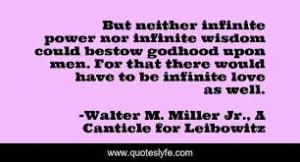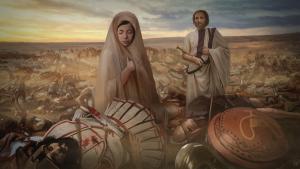Chapter 5 of David Tracy’s Fragments, Part Two

I said in a previous post that I don’t much like infinity. It makes me think of things like size and speed. Most obtrusively, it’s power—not my favorite factor in human relationships. So why would I adore an infinitely powerful God? But still, thinking of God as infinite seems universal if not natural. David Tracy, in his later years of God searching, has increasingly focused on the Infinite, a category he finds in some mystics. He spends time also on an even more mysterious category, the Impossible. It’s a combination, along with a look at some mystics, that, helps me start liking some things infinite.
Recently a post called “Why I Do Not Think of God as ‘Infinite’” appeared in Patheos. I sympathize with the author, although I end up, after a struggle, in a different place. The phrase “infinitely loving,” which one hears often, including from Pope Francis, points to an appropriate kind of infinity for God—provided infinitely loving is something one can make sense of. That is the burden of this post. It finds me dabbling in mysticism, or at least thinking beyond plain Aristotelian logic, along with my favorite theologian, David Tracy.
Part 6 in the series on David Tracy’s Fragments.
The road to modern theology’s ‘infinite’ God
Aristotle insisted that neither God nor anything else could be infinite. He allowed an infinite length of time but that’s because time is actual only one brief moment at a time. Anything actually infinite would be contrary to understanding, which proceeds by way of what Plato called forms or ideas. We might say definitions, the limits or boundaries around ideas. For the ancient Greeks definite forms, or ideas, were essential features of reality. The ancient Greeks, committed to understanding the world, despised the concept of something without limits, the Infinite.
Tracy shows how gradually the world and the Church learned to apply the concept of infinity to God. It started with the Roman philosopher Plotinus (see this post) and some of the early Church Fathers. Still, by the Middle Ages not many theologians–but, notably, Aquinas was one–were calling God infinite. Among these folks mystics and mystical theologians had a prominent role.
François Fénelon, Mysticism, and Some Thoughts on God’s Infinity
What strikes me as newest in Tracy’s Chapter Five is how Tracy sees mysticism as the area of human experience where God’s infinity comes to the fore. The obscure 17th century figure François de Salignac de la Mothe-Fénelon, François Fénelon, for short, gives Tracy a handle on the mystical approach to the infinite God.
Fenelon did not come by his mysticism all by himself. He had help from one with a name rivaling his own in length: Jeanne-Marie Bouvier de la Motte Guyon. She was the more profound mystic, and Fénelon the better philosopher, Tracy says. Both of them got into trouble with less mystical, more pragmatic Church authorities. Guyon especially did for her sometimes over-the-top descriptions of her mystical experiences. She was accused of Quietism, the idea that the soul can attain perfect union with God by being quiet, or passive. It was considered a heresy, probably because it didn’t seem to leave much place for the active moral life. (p. 117)
Guyon’s main critic, a bishop named Jacques-Bénigne Bossuet, Tracy says humbly, “probably deserves more praise than I can manage.” (p. 118) Bossuet was harsh with Guyon, but he “more politely engaged … his fellow bishop Fénelon.” Fénelon was just “a confused and duplicitous fellow traveler of Guyon.” Tracy’s judgment:
Bossuet’s knowledge of the history of mysticism was as limited as his sympathy for mysticism was scant. (118)
Tracy agrees with Fénelon that “the Infinite [is] the first and most important name for God.” (118) For Fénelon and for Tracy, mysticism is part of coming to that awareness. As for me, I’m about as unmystical a person as there is. (Though I hope I can be more sympathetic than Bossuet.) Tracy also considers himself much more a rationalist than a mystic.
Experiences you can’t measure
I wrote before that I preferred to think about God’s infinity by way of experiences that you can’t measure or quantify. Like:
… love, joy, indescribable suffering and the empathetic response to suffering, anxiety, loyalty, and the martyr’s devotion to a cause, the experience of beauty in a work of art or nature.
All these experiences that we can’t put numbers on, I imagined, are pointers to God’s infinity. They are pointers only. God isn’t infinite because of immeasurable things like these. Tracy says more than once in this chapter, “God is immeasurable because infinite, not the reverse.” If God’s love or joy or beauty or goodness is infinite, it’s not because no one can measure it.
When we say God’s love is beyond measure, we’re saying it is very great, not infinite. Perhaps infinity, then, is just a word that announces a feeling that we have about God. Maybe we need that word to feel like we’re praising God enough. But the Catholic mystical tradition isn’t as lacking in intellectual content as that.
The impossible
Tracy raises another concept in the same context as the infinite. That is the impossible—an odd choice when thinking about God. But Kierkegaard was serious when he called God “the Impossible.” (Fragments, p. 164) He was reacting against the philosopher Hegel’s way of making God all too reasonable. God ought to be more of an intellectual challenge, Kierkegaard thought.
Modern philosophers have proposed the concept of the impossible for other things besides God. For instance, is justice really possible or is it an ideal never to be fully realized? (Except, perhaps, in God’s ultimate future.) Is it possible to be truly giving, i.e., without any thought for one’s own advantage? (Even if it’s only feeling good about oneself?) Love may be at the top of the list of things impossible.
Paul has something to say about how impossible God’s love is:
Indeed, only with difficulty does one die for a just person, though perhaps for a good person one might even find courage to die. But God proves his love for us in that while we were still sinners Christ died for us. (Romans 5:7-8)
Paul could have given a little more credit to human love. People do give their lives for others. Scientists who study evolution speculate on how the human species might have happened upon altruism as a valuable asset in its struggle for survival. That naturalistic explanation attributes a bit of genetic self-interest to all human love. When I look for love inside myself, I find it hard to rule self-interest out. So is it really Love?
Paul’s point is in the second half of that passage above. God loved us even when we were God’s enemies. For the theory of evolution, that kind of love is hard to compute. Mystics know it’s not just a story. The mystic experience, in Christianity at least, often has two parts: God’s overwhelming love and the soul’s utter unworthiness. God loved us, Paul says, even when we were God’s enemies. The “I-m OK, you’re OK” and positive self-image of pop psychology don’t count for much in Christian experience.
Impossible love and some mystics
In this section I’m looking at three mystics more familiar than Tracy’s choices, Fenelon and Guyon. I’m not a mystic, but I believe there are people who see deeper than I can. And what they see is real.
Martin Luther, the 16th century reformer, described the self with terms like depraved and worthless. At least sometimes I feel that applies to me as well. And when that same mystic experiences God’s overwhelming and transforming love, I believe that love is mine too. And that, by all that is logical in my mind, is impossible.
The 20th century mystic Simone Weil finds at the core of human being not depravity but the possibility of affliction. We own nothing, nothing stable enough to serve as a guarantee. As Weil says, “We possess nothing in the world—a mere chance can strip us of everything.” Mere circumstance may bring not just suffering but the kind of suffering Weil labels affliction. It reduces a person to a being without hope, a non-person. It is just such people, people on the peripheries as Pope Francis says, that God, impossibly, raises up as worthy of attention and love. To love “where there is nothing to love” is a miracle. (Quotes from “Simone Weil,” Internet Encyclopedia of Philosophy)
Hildegard of Bingen
In a twelfth-century Benedictine abbey, if you had been there, you might have found the abbess enjoying wine infused with violets and honey. Or it may be coffee, provided it’s brewed with spelt. Hildegard of Bingen loved spelt, especially when she baked it into cookies with nutmeg, cloves, and cinnamon. It was her own recipe designed to “remove hate from the heart and calm the nerves.” The author of the America article with this information says – and I agree – that this is true of most cookies.
Hildegard began having visions at the age of three. She started writing about them only at age 42, when a vision told her to. No stranger to things our more normal eyes see, Hildegard wrote on nature and practiced medicine, using the curative virtues of plants. Music that she composed is still appreciated today. Wikipedia says,
Her hallmark is to emphasize the vital connection between the “green” health of the natural world and the holistic health of the human person.
She called this life-giving power “viriditas,” greenness. It sustains us by working through the balance of the elements within us. Medicine for her was a type of gardening. Her writings, says the America article, “drip with flowers and stems, honeycombs, and gemstones, streams and fountains and rivers.” Nature contains analogies for heavenly things. The Virgin is the “greenest branch.” The “sweet sap of the apple” characterizes St. Rupert. “Gaze at the beauty of Earth’s greenings. What delight God gives to humankind with all these things!”
Impossible joy
Hildegard knew the depravity that Martin Luther experienced. It was an age of corruption in the Church. That included the Church’s sin of simony and the emperor’s support for friendly anti-popes. It fell to Hildegard to chastise both Church and emperor. In her practice of medicine she may have known the affliction that Simone Weil shared with the poor. Yet, in the face of such depravity and affliction, her writings bubble over with joy. Why isn’t this joy impossible?
How can I experience joy deeper than mere distraction? Every day thousands die from covid-19. Maddeningly, a president and many of his followers care only about overturning the results of the last election. My generation is at war with the natural inheritance of my children and all future generations. But much of my Church and one political party prefer to fight battles around abortion and same-sex marriage. They imagine that that’s what pro-life means. White privilege and the power of money make a sham of the democratic ideal of equal opportunity. Democracy itself is under threat from fear mongering, hate speech, and conspiracy theories. How can I be joyful?
Yet joy lifts up its impossible face when granddaughter Elodie fries rocks (i.e. “bacon”) in her toy cookware. Then she feeds Baby Jesus, whom I have just laid in the manger.
History doesn’t record, as far as I know, that Hildegard had any success in her dealings with emperor and pope. But, without any guarantee of success, joy inhabits the lives of whoever loves without expecting return.
Delight bubbling over
Joy would be a good name for love. I mean the kind of joy that delights in the presence of another person or thing. Then joy is not just a subjective feeling but a response to what’s out there. It has a kind of objectivity and truth. There is something to be delighted about. That delight, rather than any helpful deed, is the essence of love. It’s what goes on among the persons of the Blessed Trinity which makes it possible to say, “God is love (not power).” It’s what bubbles over, freely, with no prior conditions, into creation and redemption.
Perhaps there are people like that, bubbling over with love that looks just like joy. (Call them saints.) Is there any other kind of love? Isn’t love that is not also delight just a duty and a burden?
Infinite God
This post began with a desire to make sense of God’s infinity that would not be an infinity of power. I meant power in its usual, literal sense, like the power to remove a mountain to the sea or make something out of nothing or even the power to bend another’s will to one’s own. I suggested that in God love, not power, might be infinite. But how does that make sense?
Tracy raises the category of the impossible alongside the category of the infinite. I looked at some impossibilities, like justice, giving, love and the situations where love is especially impossible. And, the mystics say, love still operates, even the love that is joy. Could God be so powerful that even impossible situations are no obstacle? That would be infinite power, but it doesn’t seem very much like love.
More power doesn’t make one a better lover. And exercising one’s superior power is rarely, if ever, the best way to love. I doubt that God loves that way. God is love; the Bible doesn’t say God is power. Jesus’ sacrifice on the cross, God’s ultimate act of love, exhibits not the slightest hint of power.
Infinite power doesn’t explain infinite love. Love does have a connection to power, but it goes in the other direction. Love strengthens and draws out power in love’s addressee. Being the receiver of love from the person who became my wife allowed me to see power I didn’t know I had. God’s love makes anyone lovable and able to love. So love explains power, not the other way around. And so I need to stop trying to find something that explains love explain love and accept the fact: Love exists. If the mystics are right, then God overcomes impossible obstacles with infinite love. And then that is where explaining or making sense begins.












